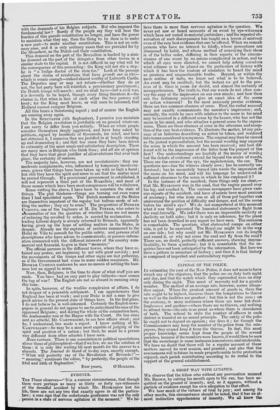EVIDENCE.
THE Times observes—" It is a curious circumstance, that though there were perhaps as many as thirty or forty eye-witnesses of the dreadful accident by which Mr. Hussissoar lost his life, there are not any two that exactly agree in all the particu- lars; a sure sign that the unfortunate gentleman was not the only person in a state of nervous agitation at the moment." We be- lieve there is more than nervous agitation in the question. We never yet saw or heard accounts of an event by eye-witnesses which have not varied in material particulars ; and the repeated ob- servation of such discrepancies has taught us a lesson of mistrust even of the very best evidence that can be offered. When we remark persons who have no interest to falsify, whose perceptions are sharpened by habit, and whose method of conveying their ideas is of the better order, differing in their reports of the circum- stances of one event by no means complicated in action, and to which all eyes were directed, we cannot help asking ourselves what reliance is to be placed on the particulars of history with which it has been the custom of education to hoard the mind as precious and unquestionable truths. Beyond, or within the mere outline of facts, we know not what is to be believed. An event may be credited; but the instant we get to the pro- cess of it, there is room for doubt, and almost the certainty of misapprehension. The truth is, that our words do not often con- vey the copy of the impression on our own minds ; and how then can the testimony received give an exact idea of the scene or action witnessed? In the most anxiously precise evidence, there are two common chances of error. First, the verbal account may not exactly communicate the narrator's impression ; and, secondly, the words he uses with relation to the scene in his mind may be received in a different sense by the hearer, who has not the scene in his mind, and who attaches a general sense to the expres- sions. There are these chances of error in the utterance and recep- tion of the very best evidence. To illustrate the matter, let any pas- sage of an historian describing an action be taken, and rendered into terms considered synonymous. The original may then be viewed as the justest representation, but the second wording may express the sense in which the account has been received ; and how dif- ferent will be the impression of the latter from the purport of the first ! Our understandings are fearfully at the mercy of words ; but the defects of evidence extend far beyond the errors of words. There are the errors of the eye, the apprehension, the ear. The questions are—has the witness clearly seen ; has he correctly un- derstood ; has he accurately turned into words the impression of the scene on his mind, and will his language be understood in sufficient closeness to the sense in which he has employed it ? In the instance of the accident, three things only are clear,— that Mr. HUSKISSON was in the road, that the engine passed over his leg, and crushed it. The various newspapers -have given vari- ous reports of the accident, and have of course been most anxious of accuracy; but who from one or all of them put together can understand the position of difficulty and danger, and set the scene before his mind's eye? We do not comprehend at this moment what it was that prevented the lamented statesman's flight from the road laterally. We infer there was an impassable acclivity or declivity on both sides ; but it is only an inference, for the place has not been described in any report we have seen. The omission is remarkable. The question, what obstructed escape on either side, is yet to be answered. The Royal car might be in the way on one side ; but why could not Mr. Husuissom run its length and round it, or why not cross the road and fly from the road? There are, no doubt, perfectly sufficient answers, showing imprac- ticability, to these questions ; but it is remarkable that the in- quiries have not been anticipated by the information. But here we have a pattern in miniature of history ; and thus it is that history is composed of imperfect and contradictory reports.


























 Previous page
Previous page